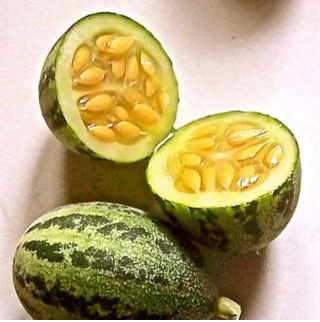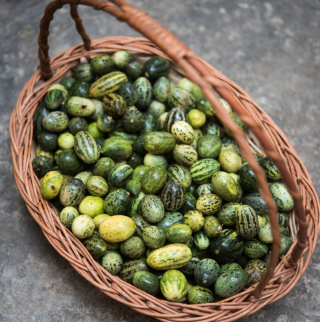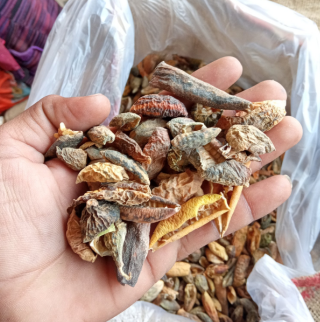COloursking
KachriKachri, also known as wild melon or Cucumis callosus, is a popular vegetable in the Indian state of Rajasthan. It is a type of cucumber that grows in arid and desert regions, making it well-suited for the dry climate of Rajasthan. Kachri has a slightly tangy and citrusy flavor, and it is often used in Rajasthani cuisine to add a distinctive taste to various dishes.
In Rajasthan, kachri is commonly used in the preparation of traditional dishes like Kachri ki Sabzi, where it is cooked with spices to create a flavorful curry. Due to its ability to thrive in harsh conditions, kachri has become an essential part of the local culinary culture in Rajasthan, providing a unique taste to the regional cuisine.
Kachri, like many vegetables, can contribute to a healthy and balanced diet due to its nutritional content. While specific nutritional values can vary, here are some general benefits associated with consuming vegetables like kachri:
- *Vitamins and Minerals:* Vegetables, including kachri, are often rich in essential vitamins and minerals. These micronutrients play crucial roles in various bodily functions, such as maintaining a healthy immune system, promoting proper cell function, and supporting overall well-being.
- *Fiber:* Vegetables are a good source of dietary fiber, which is important for digestive health. Fiber can help regulate bowel movements, prevent constipation, and contribute to a feeling of fullness, which may aid in weight management.
It’s important to note that the specific nutritional content of kachri can vary, and individual dietary needs may differ. Including a variety of vegetables in your diet is generally recommended to ensure a broad spectrum of nutrients. If you have specific health concerns or dietary requirements, it’s advisable to consult with a healthcare professional or a registered dietitian for personalized advice.
STORAGE AND LIFE OF RAJASTHANI KACHRI
To store kachri and extend its shelf life, you can follow these general guidelines:
- *Refrigeration:* Store fresh kachri in the refrigerator to slow down the ripening process and inhibit the growth of microorganisms. Place them in the vegetable crisper drawer, preferably in a perforated plastic bag to maintain proper humidity.
- *Keep Dry:* Ensure that the kachri are dry before storing them. Excess moisture can lead to mold and spoilage. Wipe them with a clean cloth or paper towel if they are damp.
- *Ventilation:* Allow for some ventilation to prevent moisture buildup. Using perforated plastic bags or storing kachri in a mesh produce bag can help maintain proper airflow.
- *Separation:* Store kachri separately from other fruits and vegetables. Some fruits release ethylene gas, which can accelerate the ripening of kachri and other ethylene-sensitive produce.
- *Check Regularly:* Periodically check the stored kachri for any signs of spoilage, such as mold, softening, or off odors. Remove any damaged or overripe ones to prevent the spread of decay.
In terms of the shelf life of kachri, it is generally best to consume them within a week or two of purchase for optimal freshness. However, like many vegetables, the shelf life can vary based on factors such as storage conditions, initial quality, and the time between harvesting and purchase.
NOTE:-If you plan to keep kachri for an extended period, you might consider freezing them. Wash, peel, and cut the kachri into desired shapes before freezing. Properly packaged, frozen kachri can last for several months.
Remember that these are general guidelines, and the specific storage recommendations may vary based on local conditions, the freshness of the produce at the time of purchase, and other factors. Always use your judgment and check the condition of the kachri regularly.



Get In Touch
Location
1082, LIC COLONY, NEAR BANK COLONY, SRI GANGANAGAR, RAJASTHAN 335001
coloursking015@gmail.com
CALL US
+91 76657 97111
+91 76657 97111
TELEGRAM
+91 76657 97111
Hours
Mon:10am – 7pm
Tue: 10am – 7pm
Wed: 10am – 7pm
Thur: 10am – 7pm
Fri: 10am – 7pm
Sat: 10am – 7pm
Sun: Closed
